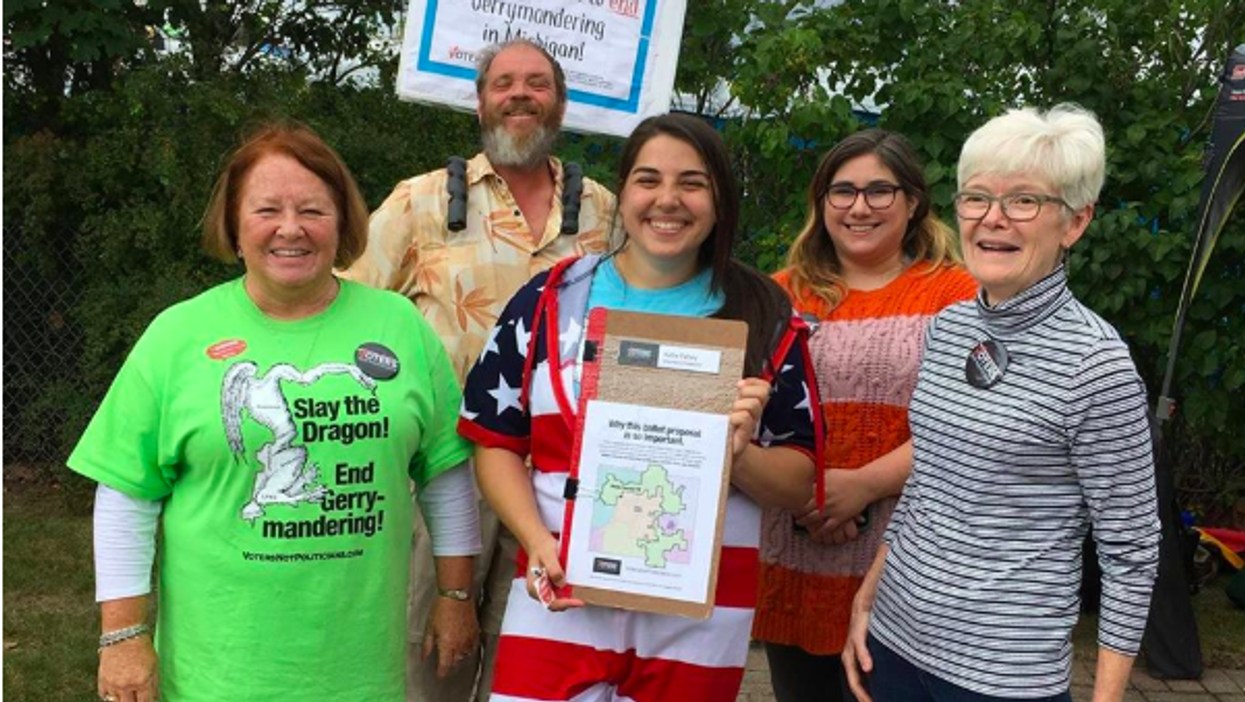Fahey, who organized the grassroots movement that ended Michigan's politicized gerrymandering, is now executive director of The People , which is forming statewide citizen networks to promote government accountability. She will be interviewing another democracy reformer each month for our Opinion section.
Everyday people are the backbone of the democracy reform movement. As executive director of The People, a new national effort to find common ground and make non-partisan changes to fix our broken democracy, I am most inspired by those who volunteer their time and energy to make sure their government hears not just their voices, but their neighbors' voices, too.
In the coming months, I have the opportunity to introduce you to some of the men and women from across the country whose powerful stories of civic engagement are bettering their communities and repairing America's torn social fabric. Before we kick off this series, I wanted to take a moment to share with you my own journey working toward democracy reform.
On Election Day 2016, I was a Michigander in my twenties working in the recycling industry. The next day, everything changed. I was still that woman, but as the result of a Facebook post I wrote — "I'd like to take on gerrymandering in Michigan. If you're interested in doing this as well, please let me know :)" — I found myself on a two-year journey alongside over 10,000 fellow Michiganders from across the political spectrum to make rigged voting maps a thing of the past. Our work led millions of voters to call for an end to the practice of partisan gerrymandering in the state — with a ballot initiative passed with 61 percent of the vote. We became living proof that concerned citizens could stand up, beat the odds and enact meaningful reform.
It didn't happen overnight. In reflecting on our success, I have asked myself many questions: Why did this Facebook post go viral, when others did not? Why did it resonate with so many different people? What inspired thousands of people to use their vacation days, nights and weekends, and resources to collect signatures and talk to their neighbors about civics? I have come to believe that in a divisive time — the post went viral days after the 2016 election — people from all different ideologies wanted a system of government that treated them equally. This was an idea we all could get behind and we did.
A sense of pride in country has been part of the fiber of my being for as long as I can remember. Growing up, I stayed up late every July 3 to sing the national anthem at midnight. If you spend time with me, inevitably you will see me sporting one of my most prized possessions, an item of clothing that features the slogan, "Who said democracy can't be fun?" It's a patriotic onesie, perfect for occasions such as gathering signatures, celebrating campaign victories, or keeping star-spangled and cool on a warm summer day.
My sense of pride in our nation stems from the fact that in the United States we have unusual freedom to be part of our political process. This freedom is something I cherish. I know from firsthand experience that it is not always an easy process to navigate, and that sometimes it feels like the system is actively working against the voice of the people. While it may not be simple, it is within our power and it's our responsibility to make change happen. And that is a privilege I hold dear.
First in Michigan, and now with The People, I have encountered literally thousands getting involved in their government, many for the very first time. The voices fueling democracy reform movements are diverse and inspiring and absolutely critical to achieving a government of, by, and for the people. They are moms and dads, teachers and students, grandmothers and teenagers. They are standing up and that matters. It is my hope that The People can help all of us navigate the roadblocks that serve as barriers to playing our role in government and getting involved.
Following our victory in Michigan I teamed with DoSomething co-founder Andrew Shue. With input from pollster Frank Luntz and hundreds of concerned citizens from across the country, we brought 100 Americans from all 50 states, all backgrounds, races, and political parties to Washington for The People's National Assembly. Standing alongside them at the National Archives, surrounded by our nation's founding documents, was one of the most truly awesome moments of my life. Watching fast friendships blossom as conservatives, liberals and independents checked those labels at the door — and worked together to identify the shared concerns, hopes and commitment we have for our country — was something I won't soon forget.
Our founders took a great leap of faith in forming a more perfect — though imperfect — nation deriving its power from the consent of its people. It is our duty as Americans to understand our history and freedoms, and to carry that torch to celebrate and ensure our country continues to strive to live up to its core values. I hope by reading interviews with other reformers we can learn more about our fellow Americans working to better our country, and how there is a place for each of us to get more involved. Every person has the right to be heard and wear a patriotic onesie with pride.



















